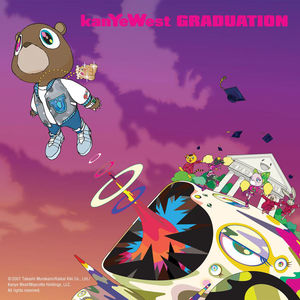 Because music doesn't exist in a vacuum, cross-generational comparisons between artists are inevitable. These usually manifest themselves as some sort of dismissal of contemporary music, as in "Well, who are our Beatles then?" As if today's music is somehow unnecessary because they Beatles made great music 40 years ago. And because music doesn't exist in a vacuum, the answer to that question is simple: the Beatles are our Beatles.
Because music doesn't exist in a vacuum, cross-generational comparisons between artists are inevitable. These usually manifest themselves as some sort of dismissal of contemporary music, as in "Well, who are our Beatles then?" As if today's music is somehow unnecessary because they Beatles made great music 40 years ago. And because music doesn't exist in a vacuum, the answer to that question is simple: the Beatles are our Beatles.When another band comes around and more or less lays the foundation for the next 40 years of pop music, there's your new Beatles. But when it happens, Beatles comparisons just won't sound right, because the songs won't resemble the Beatles in the slightest, and that's what will make it all so Beatlesesque.
"Well, then who is our Bob Dylan?"
I mean, sure, the answer is still Bob Dylan. But really, it's Kanye West.
People always bristle at this comparison. It's like in the NBA where white players are compared exclusively to other white players--like it's inconceivable for a white guy to have a game like Magic, or a black guy to play like Bird. And maybe those are the wrong comparisons--Bird and Magic had games that transcended black and white because they were such phenomenal, once-in-a-lifetime talents, but because of this, they became--Bird more than Magic--the platonic ideal for players of their respective races. This is how you end up comparing Keith Van Horn to Larry Bird--maybe it looks right if you squint, but if you open your eyes, you barely see the resemblance.
Bob Dylan, to most people, is a skinny white guy with a guitar and a questionable voice who just happens to be a genius poet. When you take away the genius poet part, you get a skinny white guy with a guitar and a questionable voice. This is how Connor Oberst got compared to Bob Dylan. Connor Oberst is the Keith Van Horn of folk music.
Naturally, Bob Dylan was more than just a genius poet with a guitar--he was an arrogant, shit-starting prick who craved attention from everyone at all times and got it, because he was just that good. It takes a special kind of talent to overcome an ego like that--to believe that you are truly god's gift to humanity, and then get everyone else--fans, critics, your contemporaries--to believe it too? Sound familiar?
Kanye West has a Dylanesque ego--that's not up for debate. This is a man who routinely compares himself to Jesus and truly means it. He's also a petulant, overly-sensitive man child who routinely throws epic hissy fits at meaningless awards shows when he doesn't win their meaningless awards. He has a blog where, in between materialistic ramblings about gadgets and clothes, he will respond immediately, usually in ALL CAPS, to any perceived slight and once admitted that he was "typing so fucking hard [he] might break [his] fucking Mac book Air!!!!!!!!"
And yet, everybody loves him. He comes across at such a polarizing figure--an arrogant jerk who makes music that seems to white for rap radio and too black for the still-surprisingly-large "anything but rap & country LOL!" contingent. But he's had 3 straight number one albums and sold over 10 million records in the U.S. alone since 2004. He gets rave reviews from every conceivable media outlet from the Source to Pitchfork. Do you know how hard it is to be hipster and Hot97 approved? That just doesn't happen. Ask the Clipse.
Kanye West has taken rap music--a genre riddled with archaic rules and holier-than-thou purists--and turned it into something that can be nearly universally appreciated. Graduation takes chances--sure, it's still full of club beats, but they're more French discotheque than "In Da Club"--he samples Steely Dan, Daft Punk, and Can and you don't even care that he's pandering to white people because it all sounds so good(1).
Late Registration & College Dropout may have had his biggest hits, and his most enduring pop hits may very well be in the form of songs he produced for others, but Graduation is, pure and simple, a focused declaration of pop genius and artistic expression. It's a record that transcends the simple "rap" genre tag and Kanye's so-called limited skills as an MC(2).
And even if you don't believe it's his best or most important or even good, you still have to recognize the album--and Kanye himself--as a sign of progress for hip-hop & rap, both for total mainstream acceptance and artistic viability. Graduation gave Kanye the freedom to make an electro-pop record with nothing but autotuned vocals and the credibility to get away with it.
Is the autotune on 808's & Heartbreaks his Dylan-goes-electric moment? I guess you could argue that in some circles, T-Pain is as big of a blight on hip-hop as electric guitars were on folk. Either way, they both pulled it off, and music is better off because of it.
(1) Alright, not the Can-sampling "Drunk & Hot Girls"; that's probably the record's only 100% skippable track.
(2)Complaining about Kanye's rapping is like complaining about Dylan's singing voice--if it works, it works.
kanye is okay. but our bob dylan? come on.
ReplyDelete